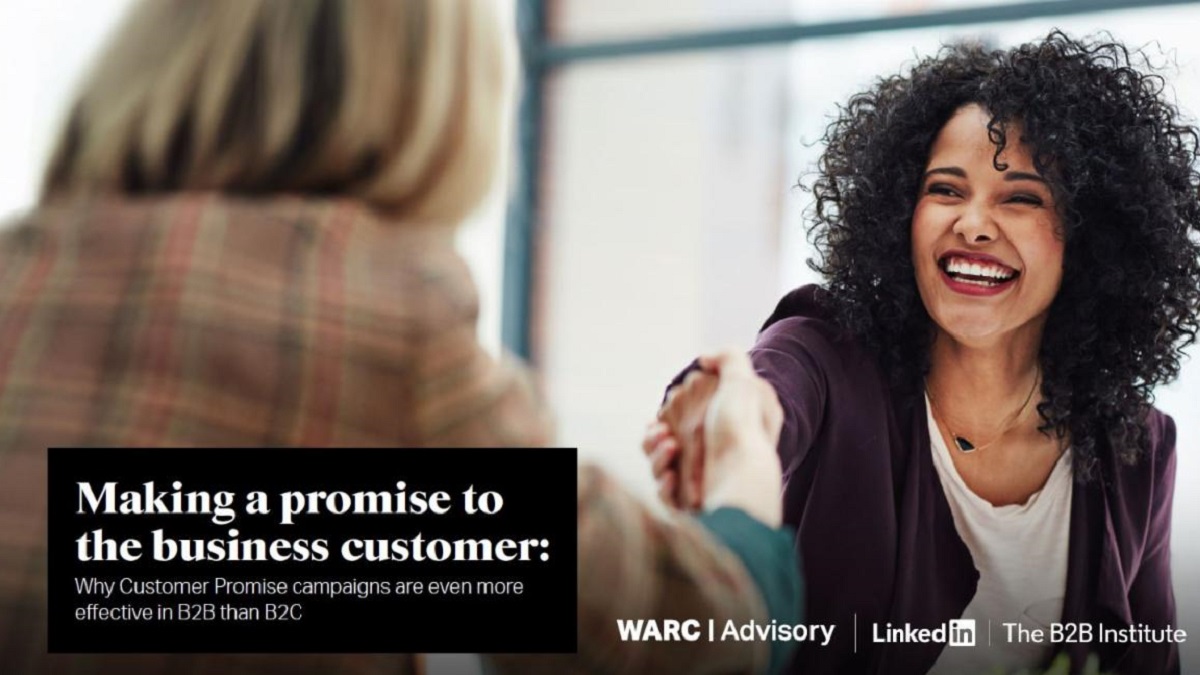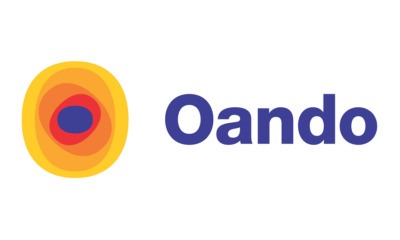New research by WARC Advisory, in partnership with The B2B Institute at LinkedIn, and strategy expert Roger Martin finds that campaigns that make a Promise to the Customer are even more effective in B2B than B2C
The new report, “Making a promise to the business customer: Why Customer Promise campaigns are even more effective in B2B than B2C,” is based on an analysis of over 700 global B2B campaigns
Customer Promises are much less common in B2B – only 18% of B2B campaigns make a Customer Promise compared to 40% of B2C campaigns
Customer Promise campaigns in B2B are more effective when budgets are tight
13 August 2024 – WARC Advisory in partnership with The B2B Institute, LinkedIn’s marketing think tank, and strategy expert Roger Martin today published “Making a promise to the business customer: Why Customer Promise campaigns are even more effective in B2B than B2C”. This new white paper will help business-to-business (B2B) marketers understand why placing a clear Customer Promise at the heart of their strategy – chiefly a promise that is memorable, deliverable, and valuable – is more likely to bear brand building and commercial rewards. This is the second edition of last year’s report, “Making a Promise to the Customer: How to give campaigns a competitive edge,” that largely analysed B2C campaigns.
Based on an analysis of 700 global B2B campaigns from North America, Europe, MENA, and Asia, this new report focuses explicitly on understanding the value of Customer Promises in B2B advertising to drive impact across key brand and business metrics. The findings provide a diagnosis and a solution for B2B brands to build brand awareness and reputation by demonstrating a clear promise of value to their customers. The report features successful B2B campaigns from brands such as Procell, Workday, Sage, and Amazon India that make a clear promise to the customer.
Paul Stringer, Managing Editor, Research & Advisory, WARC, says: “Customer Promises can make brands familiar by being memorable, valuable and deliverable. They can cut through the noise and the messiness of decision making by offering a clear and simple articulation of the value delivered by a brand to its customers. It sounds simple, but of course, there is a huge amount of work involved in designing and projecting a clear Promise to the Customer. We hope that after reading this paper, more B2B marketers will see the value of going on that journey.”
Jann Martin Schwarz, Founder at The B2B Institute at LinkedIn, said: “Brand is not just a “nice-to-have,” it is an essential full-funnel deal-closing advantage. And, while there are many definitions of ‘brand,’ making a clear promise of value to your customers is the most effective way to build your brand. Our research conclusively finds that across every category, a Customer Promise is far more effective than any other kind of brand promise.
Our findings reveal that B2B campaigns that make a Customer Promise are 3x more likely to deliver increases in market share, and 2.5x more likely to deliver increases in brand health.”
Mimi Turner, Head of EMEA & Latin America at the B2B Institute at LinkedIn, said: “The great problem for marketers is not that they don’t know what to do. It is that often, they don’t have the money to do it. The huge advantage of putting a clear promise of value at the heart of a campaign is that marketers are virtually guaranteed to get better results without spending any extra money. Marketing is expensive. Customer Promises are free.
The findings show that lower budget B2B Customer Promise campaigns are 1.7x more likely to increase brand health and 2.7x more likely to increase market share than higher budget ones.
For the first time, we are able to offer an effectiveness strategy that is budget-neutral and enhances meaningful marketing metrics.”
Roger Martin, CEO Advisor, Strategist and Author of “Playing to Win”, says: “Making a Customer Promise in a B2B campaign is much more important and impactful than in a B2C campaign – across all important dimensions of performance. Yet the vast majority of B2B advertising campaigns are designed to be ineffective. And that creates a doom-loop.”
Key findings from the research are:
Customer Promise campaigns in B2B are nearly three times more likely to deliver increases in market share
B2B campaigns that made a Promise to the Customer are nearly three times more likely to report increases in market share than those that did not. They also appeared more likely to report increases in market penetration (44% vs 36%) and revenue (30% vs 20%).
Customer Promise campaigns in B2B are nearly two-and-a-half times more likely to report on brand health shifts than non-Customer Promise campaigns
Almost half (47%) of the B2B Customer Promise campaigns that were analysed delivered a meaningful uplift in key brand health measures such as consideration, preference, purchase intent and perceived quality. This compares to just 19% of non-Customer Promise campaigns, showing that in B2B, Customer Promises are almost three times as likely to deliver a meaningful impact than non-Customer Promise campaigns.
Customer Promises are much less common in B2B: Only 18% of B2B campaigns make a Promise to the Customer, compared to 40% of B2C campaigns
Fewer than one in five (18%) B2B campaigns made a Promise to the Customer, regardless of whether the objective was brand building or activation. This is significantly lower than the 40% of B2C campaigns that made a Promise to the Customer, highlighted in previous research.
Given that B2B purchases are often high-consideration / high-risk, and lead to a relatively long-term relationship between buyer and vendor, this infrequency is surprising. It suggests that making a Customer Promise could represent a competitive opportunity for B2B brands.
Customer Promise campaigns in B2B work particularly hard when budgets are tight
Customer Promises in B2B deliver valuable advantages for scale-up brands or businesses with limited marketing resources. Research showed that B2B Customer Promise campaigns appeared to be disproportionately effective at the lower end of the Creative Commitment scale (a composite of budget size, campaign duration and number of channels deployed to drive effectiveness with scores ranging from 3 to a maximum of 15), an important insight for organisations with smaller marketing budgets.
Download the full report here for actionable insights and advice to B2B brands interested in creating a Customer Promise campaign.
This B2B report follows the publication last year of “Making a Promise to the Customer: How to give campaigns a competitive edge,” which primarily focused on B2C campaigns. This research showed when B2C campaigns are grounded in an explicit Promise to the Customer, they are as much as 48% more likely to report brand health improvements than those that don’t.
Methodology
The findings of this report are based on an analysis of over 700 B2B advertising case studies from North America, Europe, MENA, and Asia drawn from the WARC database.
All B2B cases in the sample had either a campaign objective of ‘brand building’ or ‘activation’. Steps were taken to ensure the sub-samples of ‘brand building’ and ‘activation’ case studies contained the same ratio of Customer Promise to non-Customer Promise campaigns to avoid skewing the results.
The cases are all entrants or winners in major awards shows, and meet a high benchmark for creative excellence and effectiveness.


 Energy5 days ago
Energy5 days ago
 Business5 days ago
Business5 days ago
 Energy3 days ago
Energy3 days ago
 Business3 days ago
Business3 days ago
 Business3 days ago
Business3 days ago
 Energy2 days ago
Energy2 days ago
 Business3 days ago
Business3 days ago
 Energy2 days ago
Energy2 days ago










